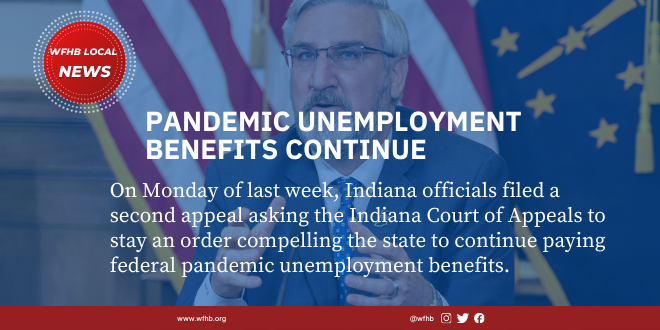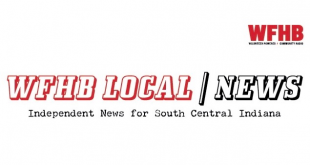Podcast: Play in new window | Download (Duration: 10:36 — 14.6MB)
Subscribe: RSS
Unemployment benefits in Indiana have been in flux for the past few months.
On Monday of last week, Indiana officials filed a second appeal asking the Indiana Court of Appeals to stay an order compelling the state to continue paying federal pandemic unemployment benefits.
The appeal marks Governor Eric Holcomb’s continued efforts to halt Indiana’s participation in three federally funded, state-administered unemployment programs.
The governor first announced his decision to withdraw from the federal programs in late May. Citing ‘help wanted’ signs across the state, he contended that generous federal benefits discouraged Hoosiers from returning to work, making it hard for businesses to find employees.
Chief Unemployment Insurance Officer Regina Ashley explained those programs, which were first authorized under the CARES Act last year.
“Those include the $300, weekly add-on – that’s called the Federal Pandemic Unemployment Compensation Program, or FPUC. Also, the benefits to independent contractors, gig workers and those otherwise not eligible for unemployment – referred to as the Pandemic Unemployment Assistant, or PUA, program. Third, the extension of benefits beyond the normal 26 weeks called the Pandemic Emergency Unemployment Compensation program, or PEUC,” said Ashley.
When Governor Holcomb’s order went into effect after the week ending June 19th, over 200 thousand Indiana residents saw their unemployment benefits reduced or eliminated, according to data from the Century Foundation. However, after two legal groups filed suit, Marion County Superior Court Judge John Hanley issued a preliminary injunction. The preliminary injunction, issued in late June, required the state to continue paying the federal benefits until a final decision is reached in the case.
Professor Kenneth Dau-Schmidt, who studies labor and employment law at the Indiana University Maurer School of Law, explained the legal dispute over pandemic unemployment in Indiana.
“A group of five workers and concerned clergy in Indianapolis filed a lawsuit,” he said, “the basis for their argument was: under Indiana law, the state is obligated to apply for all federally provided benefits that are available for unemployment compensation.”
The state’s newest appeal argues that the Marion County judge abused his discretion when he issued the preliminary injunction. The state maintains that the governor can withdraw Indiana from the federal programs at his discretion.
Last week, the Indiana Department of Workforce Development resumed paying federal unemployment benefits. Unemployed Hoosiers could file retroactively for benefits beginning the week ending June 26th.
Economists have expressed mixed opinions about the effects of expanded unemployment benefits on the labor market. Kristoph Kleiner, assistant professor of finance at IU’s Kelley School of Business, explained the rationale for cutting the federal benefits.
“Over half of the states have decided to try to cut off these extended unemployment benefits and Indiana is one of them,” he said. “A number of businesses have said that they face labor shortages one way or another. They’re essentially trying to hire workers, and they aren’t able to get them.”
However, Professor Kleiner cautioned that reducing unemployment benefits is no panacea.
“We still have reasons why people, for one reason or another, might be out of work,” he said.
Professor Dau-Schmidt suggested that the expanded benefits might be part of a broader trend in which employers must improve job compensation to attract and retain workers.
“I think doing away with those benefits isn’t going to magically clear up the problems in the labor market,” he said. “Employers are going to have to increase wages and benefits.”
Although the fight over unemployment in Indiana is a microcosm of a changing labor market, it also affects Hoosiers at an individual level.
Lane Fulton, 27 years old, lives in Elnora, a small town in Daviess County. He’s been unemployed throughout much of the pandemic.
“I worked in food service post grad school, while working through the never-ending applications,” he said. “I got furloughed from that, then I was on unemployment from May until August,” said Fulton.
Although he landed a job with the nonprofit organization Hoosier Action between August and December last year, he’s been unemployed since the beginning of 2021. Lately, he’s been busy volunteering with Hoosier Action and filling out job applications.
“It would not be an exaggeration to say that in the last year and nine months, I’ve probably done over 1,000 job applications for career-work across the United States,” said Fulton.
He’s been able to ride out the back-and-forth over unemployment compensation in Indiana, but he worries that other Hoosiers may not be so lucky.
Lane has been receiving benefits through the Pandemic Unemployment Assistance, or PUA, program. PUA provides unemployment benefits to independent contractors, the self-employed and those seeking part-time work. However, although Lane filed for regular state unemployment last summer, he did not start receiving state unemployment when the governor put PUA on pause. Lane thinks that’s because the state claims they overpaid his benefits earlier in the year. Now, he says, the state is asking him to return an exorbitant amount of money.
“The state actually wants me to pay back over $11,000 of unemployment, which is basically about two-thirds of that thirty weeks,” he said.
Lane isn’t alone. According to Indianapolis television channel WTHR, thousands of Indiana residents have been told they were overpaid.
Regina Ashley, the Chief Unemployment Insurance Officer, said that Hoosiers who receive overpayment notices can appeal or file a waiver with the Department of Workforce Development.
Overpayments aren’t the only issue that faces Hoosiers navigating the unemployment system. WTHR obtained internal data from the DWD showing that the agency had 2.6 million unresolved unemployment claims and 27 thousand pending unemployment appeals as of late April. DWD Commissioner Frederick Payne denied that the agency was experiencing a backlog.
Indiana’s unemployment rate hovered at 4.1% last month. This preliminary number suggests that unemployment remained similar to its level in May, but down from its high in April 2020, when 16.9% of the Indiana labor force was unemployed.
Commissioner Payne expressed an optimistic view of the state’s unemployment numbers.
“We have processed more than 90 something percent of the claims that have come through Our Shot,” said Payne. “If there is someone who’s waiting beyond 21 days, there’s some complications.”
The unemployment report for July will be released late next month.
 WFHB Bloomington Community Radio
WFHB Bloomington Community Radio


